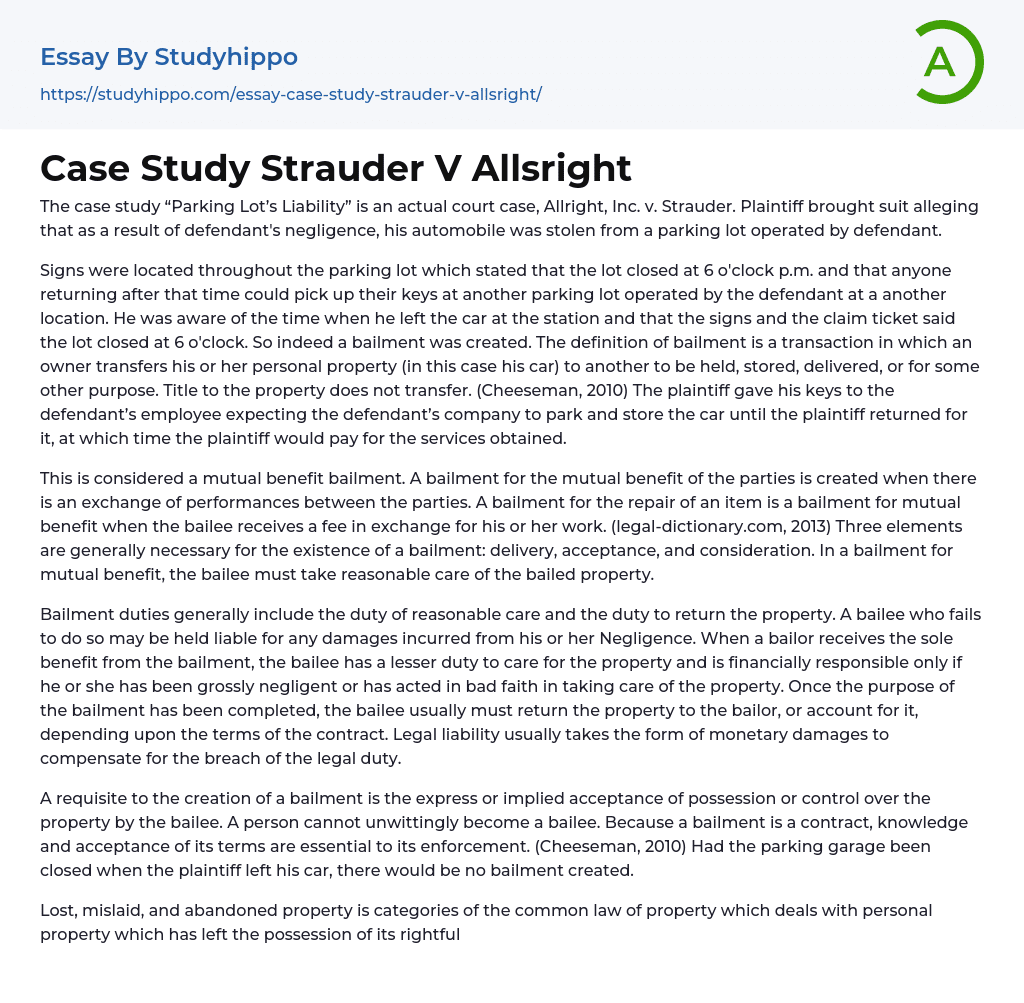The case study “Parking Lot’s Liability” is an actual court case, Allright, Inc. v. Strauder. Plaintiff brought suit alleging that as a result of defendant's negligence, his automobile was stolen from a parking lot operated by defendant.
Signs were located throughout the parking lot which stated that the lot closed at 6 o'clock p.m. and that anyone returning after that time could pick up their keys at another parking lot operated by the defendant at a another location. He was aware of the time when he left the car at the station and that the signs and the claim ticket said the lot closed at 6 o'clock. So indeed a bailment was created. The definition of bailment is a transaction in which an owner transfers his or her personal property (in this case his car) to another to
...be held, stored, delivered, or for some other purpose. Title to the property does not transfer. (Cheeseman, 2010) The plaintiff gave his keys to the defendant’s employee expecting the defendant’s company to park and store the car until the plaintiff returned for it, at which time the plaintiff would pay for the services obtained.
This is considered a mutual benefit bailment. A bailment for the mutual benefit of the parties is created when there is an exchange of performances between the parties. A bailment for the repair of an item is a bailment for mutual benefit when the bailee receives a fee in exchange for his or her work. (legal-dictionary.com, 2013) Three elements are generally necessary for the existence of a bailment: delivery, acceptance, and consideration. In a bailment for mutual benefit, the
bailee must take reasonable care of the bailed property.
Bailment duties generally include the duty of reasonable care and the duty to return the property. A bailee who fails to do so may be held liable for any damages incurred from his or her Negligence. When a bailor receives the sole benefit from the bailment, the bailee has a lesser duty to care for the property and is financially responsible only if he or she has been grossly negligent or has acted in bad faith in taking care of the property. Once the purpose of the bailment has been completed, the bailee usually must return the property to the bailor, or account for it, depending upon the terms of the contract. Legal liability usually takes the form of monetary damages to compensate for the breach of the legal duty.
A requisite to the creation of a bailment is the express or implied acceptance of possession or control over the property by the bailee. A person cannot unwittingly become a bailee. Because a bailment is a contract, knowledge and acceptance of its terms are essential to its enforcement. (Cheeseman, 2010) Had the parking garage been closed when the plaintiff left his car, there would be no bailment created.
Lost, mislaid, and abandoned property is categories of the common law of property which deals with personal property which has left the possession of its rightful owner without having entered the possession of another person. Property can be considered lost, mislaid or abandoned.
Property is generally deemed to have been lost if it is found in a place where the true owner likely did
not intend to set it down, and where it is not likely to be found by the true owner. Property has been mislaid or misplaced if it is found in a place where the true owner likely did intend to set it, but then simply forgot. If property has been abandoned, it is found in a place where the owner likely intended to leave it, but is in such a condition that it is apparent that he or she has no intention of returning to claim it.
Let’s say Strauder’s car was old and in poor shape, the engine stalled so he pushed it into the parking garage of the defendant. The next morning he forgot where he had left his car. This could be a case of mislaid property.
- Jurisprudence essays
- Social Injustice essays
- Juvenile Justice essays
- Agreement essays
- Business Law essays
- Common Law essays
- Community Policing essays
- Constitution essays
- Consumer Protection essays
- Contract essays
- Contract Law essays
- Copyright Infringement essays
- Court essays
- Crime essays
- Criminal Law essays
- Employment Law essays
- Family Law essays
- Injustice essays
- Judge essays
- Jury essays
- Justice essays
- Lawsuit essays
- Lawyer essays
- Marijuana Legalization essays
- Ownership essays
- Police essays
- Property essays
- Protection essays
- Security essays
- Tort Law essays
- Treaty essays
- United States Constitution essays
- War on Drugs essays
- Academia essays
- Academic And Career Goals essays
- Academic Integrity essays
- Brainstorming essays
- Brown V Board of Education essays
- Brown Vs Board Of Education essays
- Coursework essays
- Curriculum essays
- Distance learning essays
- Early Childhood Education essays
- Education System essays
- Educational Goals essays
- First Day of School essays
- Higher Education essays
- Importance Of College Education essays
- Importance of Education essays
- Language Learning essays




